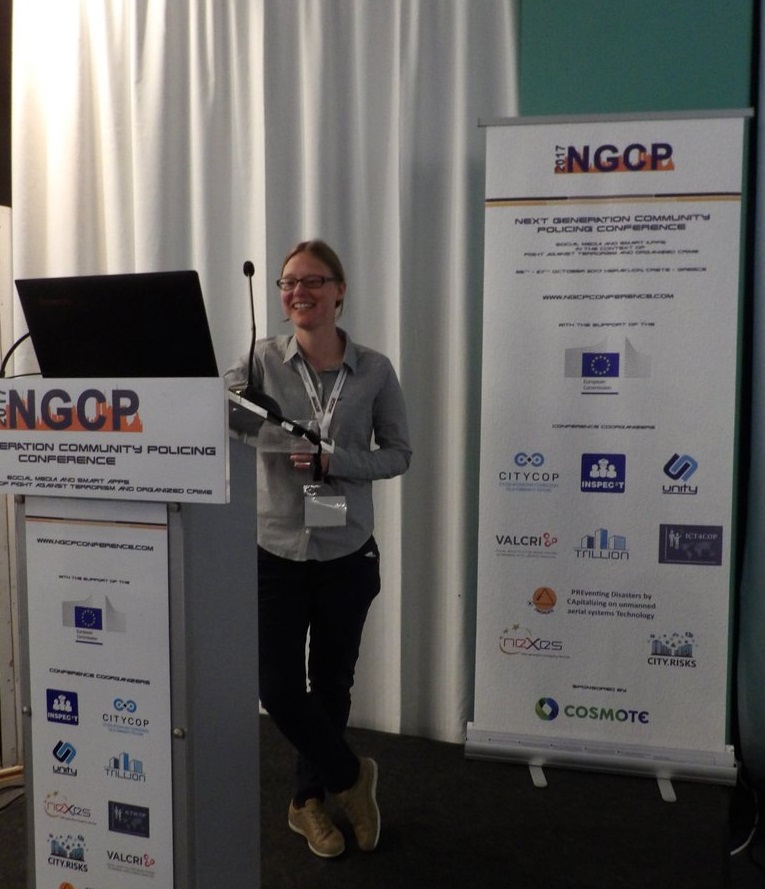From the 25th – 27th October, the CENTRIC team were at the NGCP (Next Generation Community Policing) International Scientific Conference in Crete.
The conference was a huge success and included the presentation of fifty-six scientific papers, of which CENTRIC presented 3, more details on these can be found below;
Marzell, L., Brewster, B. (2017) A Framework for Trust. Next Generation Community Policing Conference. Crete, 25-27th October 2017
Community Policing across the UK, Europe and further afield, is the bedrock for keeping society and its communities and citizens safe, secure and resilient. Underpinning this approach is the requirement for trust. The Community Policing Architecture Framework (CPAF), is a mechanism enabling us to better understand and share information at a community level, and provide an essential building block to create and sustain trust and, ultimately, the means by which shared Community Policing outcomes can be achieved. The CPAF creates a mechanism to better understand and share information at a community level, and provide an essential building block to create and sustain trust and, ultimately, the means by which shared CP outcomes can be achieved.
Brewster, B., Gibson, H., Gunning, M., Akhgar, B. (2017) Policing the Community Together: the Role of Technology in Citizen Engagement. Next Generation Community Policing Conference. Crete, 25-27th October 2017
A common theme throughout community and neighbourhood policing strategies establishes the need to target improvements in the relationship and level of engagement between the police and communities aiming to move away from reactive policing models towards a more proactive philosophy. Smartphones and other ICTs are often seen as a vector which can instil a culture of proactive engagement. This research builds upon existing research suggesting technologies for crime prevention should be designed to support communications and problem-solving rather to simply disseminate information, unpacking a number of the core concepts central to participation and effective engagement; social capital, public participation and social and digital inclusion. Moreover, examples, which target the engagement of communities through the use of technology, of wider initiatives are comparatively discussed, before reflecting on the empirical evidence and experiences gleaned through the EU H2020 funded ‘UNITY’ project, a project that sought to establish effective strategies for engagement between police and citizen communities.
Day, T., Gibson, H., Gunning, M., Akhgar, B. (2017) You are not Alone: Enhancing Humanitarian Field Staff Security. Next Generation Community Policing Conference. Crete, 25-27th October 2017
As the dangers of terrorism, natural disasters and crime become more prominent, the awareness and responsibility for personal safety has increased. Aid and field workers are often at risk given their locations in remote, hostile or unstable environments. IOM (International Organisation for Migration – the UN Migration Agency) has over 10,000 operational staff in 166 countries including zones of conflict, disaster and political instability. IOM has recognised that the use of technology, including mobile applications and a centrally available dashboard, could be combined to provide supplementary security capabilities to IOM staff and those responsible for their safety. SCAAN (Security Communications and Analysis Network) consists of a cross-platform mobile application supporting a simple emergency alerting system, opt-in GPS tracking, on-the-ground reporting, direct messaging with the operations centre, and instant notifications of major disasters and attacks. In parallel, those in the operations centre can monitor their staff, respond to incidents in a timely fashion, request and receive updates from those out on missions, and generally enhance their situational awareness of current IOM operations. This researched explored the iterative, co-creative processes with IOM that led to the requirements, development and testing of SCAAN as well as the acceptance of and the challenges raised by such a solution from IOM staff.

Dr. Helen Gibson presenting at the NGCP Conference in Crete

